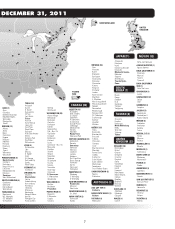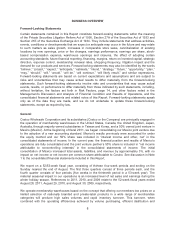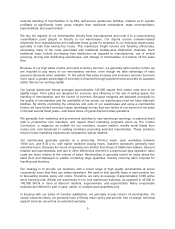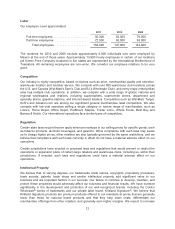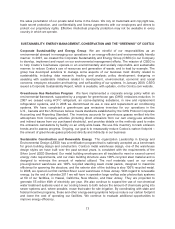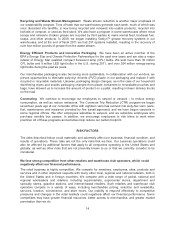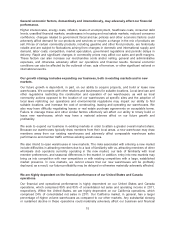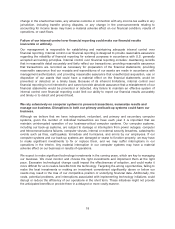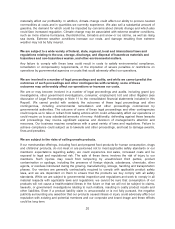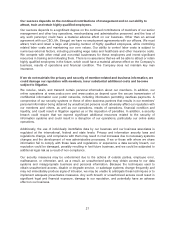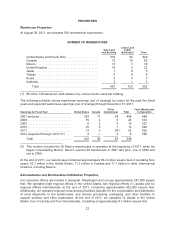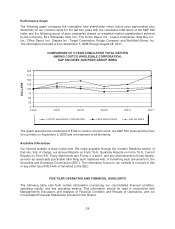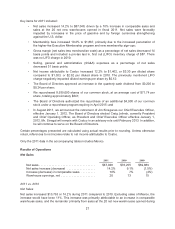Costco 2011 Annual Report Download - page 19
Download and view the complete annual report
Please find page 19 of the 2011 Costco annual report below. You can navigate through the pages in the report by either clicking on the pages listed below, or by using the keyword search tool below to find specific information within the annual report.and our market share. If we are not successful at predicting our sales trends and adjusting our
purchases accordingly, we may have excess inventory, which could result in additional markdowns and
reduce our operating performance. This could have an adverse effect on margins and operating
income.
Our failure to maintain positive membership loyalty and brand recognition could adversely
affect our financial results.
Membership loyalty is essential to our business model. Damage to our brands or reputation may
negatively impact comparable warehouse sales, lower employee morale and productivity, diminish
member trust, and reduce member renewal rates and, accordingly, membership fee revenues,
resulting in a reduction in shareholder value.
In addition, we sell many products under our owned and exclusive Kirkland Signature brand.
Maintaining consistent product quality, competitive pricing, and availability of our Kirkland Signature
products for our customers is essential to developing and maintaining customer loyalty. These
products also generally carry higher margins than national brand products and represent a growing
portion of our overall sales. If the Kirkland Signature brand experiences a loss of consumer acceptance
or confidence, our sales and gross margin results could be adversely affected.
Changes in accounting standards and subjective assumptions, estimates and judgments by
management related to complex accounting matters could significantly affect our financial
results.
Generally accepted accounting principles and related accounting pronouncements, implementation
guidelines and interpretations with regard to a wide range of matters that are relevant to our business,
including, but not limited to, revenue recognition, sales returns reserves, impairment of long-lived
assets and warehouse closing costs, inventories, vendor rebates and other consideration, self-
insurance liabilities, income taxes, unclaimed property laws and litigation, and other contingent
liabilities are highly complex and involve many subjective assumptions, estimates and judgments by
our management. Changes in these rules or their interpretation or changes in underlying assumptions,
estimates or judgments by our management could significantly change our reported or expected
financial performance. Provisions for losses related to self-insured risks are generally based upon
independent actuarially determined estimates. The assumptions underlying the ultimate costs of
existing claim losses can be highly unpredictable, which can affect the liability recorded for such
claims. For example, variability in inflation rates of health care costs inherent in these claims can affect
the amounts realized. In March 2010, the Patient Protection and Affordable Care Act and the Health
Care and Education Reconciliation Act of 2010 were enacted. This legislation expands health care
coverage to many uninsured individuals and expands coverage to those already insured. We expect
our healthcare costs to increase, but not materially, as a result of this legislation. Similarly, changes in
legal trends and interpretations, as well as a change in the nature and method of how claims are
settled can impact ultimate costs. Although our estimates of liabilities incurred do not anticipate
significant changes in historical trends for these variables, any changes could have a considerable
effect upon future claim costs and currently recorded liabilities and could materially impact our
consolidated financial statements.
Unfavorable changes in tax rates could adversely affect our operations, financial conditions or
cash flows.
We compute our income tax provision based on enacted tax rates in the countries in which we operate.
As the tax rates vary among countries, a change in earnings attributable to the various jurisdictions in
which we operate could result in an unfavorable change in our overall tax provision. Additionally, any
17


